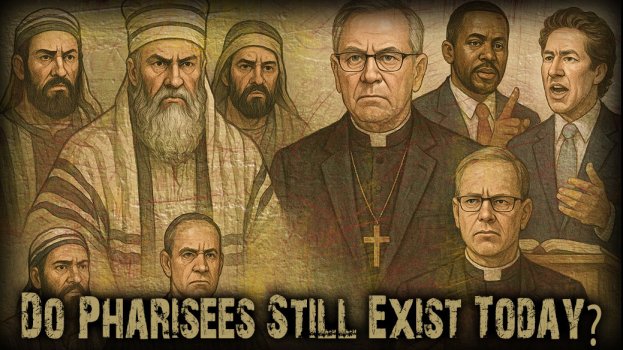
By the Bible’s standard, yes, they do.
They may not wear robes or go by that name anymore, but the spirit of the Pharisees is alive and active today. If you want to see an example, click here. In Jesus’ time, the Pharisees were the religious elite, outwardly righteous, but inwardly corrupt. They claimed to follow God, but twisted His Word, exalted their own traditions, and rejected truth when it confronted them. That same pattern can be seen today in churches, ministries, denominations, and individuals who elevate man-made systems over Scripture, and parade their religion while denying its power.
Jesus said, “Full well ye reject the commandment of God, that ye may keep your own tradition” (Mark 7:9). Today, we see the same thing, people defending their creeds, councils, or denominational systems as if they were Scripture itself. But God doesn’t honor man’s additions. If it doesn’t come from the Bible, it’s not binding on anyone.
Modern Pharisees love outward religion. Jesus said, “This people draweth nigh unto me with their mouth, and honoureth me with their lips, but their heart is far from me” (Matthew 15:8). That describes anyone who talks the talk, going to church, quoting verses, wearing the label, but doesn’t actually walk with God. You can sing hymns, wear a cross, and still be far from Christ.
Another mark of a Pharisee is legalism, making up burdens God never commanded. Jesus said, “They bind heavy burdens and grievous to be borne, and lay them on men’s shoulders” (Matthew 23:4). Today, that looks like inventing rules about dress, diets, music styles, or behavior that are not found in Scripture, then judging others who don’t follow them.
Pharisees also love power and titles. Jesus said, “They love... to be called of men, Rabbi, Rabbi” (Matthew 23:6–7). Today, many love to be called “Reverend,” “Father,” “Apostle,” or “Prophet,” as if their title gives them spiritual superiority. But Jesus taught that true greatness is found in humble service, not religious status.
And maybe the clearest sign of a Pharisee is resistance to correction. Stephen told the religious leaders, “Ye do always resist the Holy Ghost, as your fathers did, so do ye” (Acts 7:51). That spirit still lives in those who shut their ears to Scripture when it exposes their tradition, pride, or false doctrine.
Where do you see Pharisees today? In religious systems that put tradition over truth, in legalistic groups that add unbiblical standards, in prosperity preachers who twist the gospel to get rich (2 Peter 2:3), in false teachers who demand blind loyalty, and in cultural Christians who have a form of godliness but no real power (2 Timothy 3:5).
So how do you avoid becoming one? Stick to the Bible alone. “Examine yourselves, whether ye be in the faith” (2 Corinthians 13:5). Let the Word of God correct you, even when it hurts. Follow Jesus, not men. And remember, “God resisteth the proud, but giveth grace unto the humble” (James 4:6).
The Pharisees didn’t disappear; they just changed clothes. And the only way to keep from joining their ranks is to humble yourself before the authority of God’s Word, not man’s religion.
A Pharisee is someone who claims to follow God but replaces His Word with man-made rules, traditions, and self-righteousness. Outwardly, they appear holy, but inwardly, they are proud, hypocritical, and resistant to correction. Jesus warned about them often because they twisted Scripture, elevated themselves, and led others away from the truth (Matthew 23:13, Mark 7:9). Pharisees are not just a group from history; their spirit still lives in anyone who puts religion above repentance and tradition above truth.


